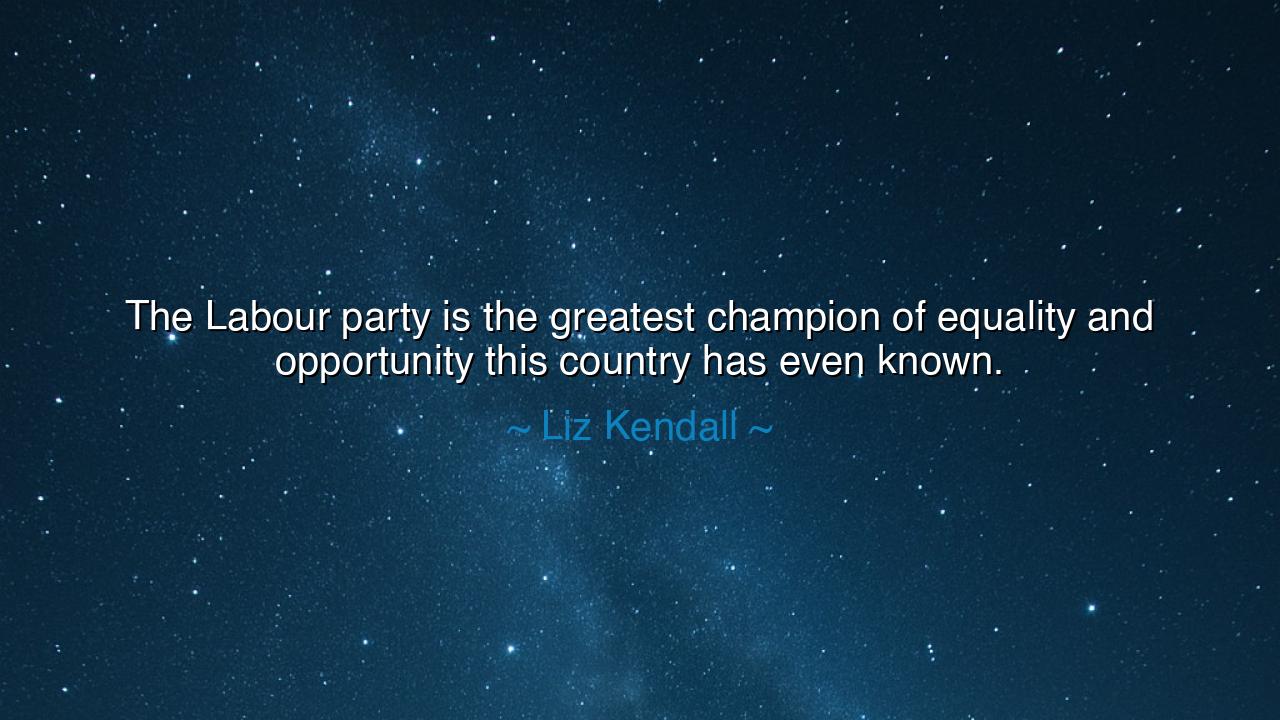
The Labour party is the greatest champion of equality and
The Labour party is the greatest champion of equality and opportunity this country has even known.






Liz Kendall once declared with proud conviction: “The Labour party is the greatest champion of equality and opportunity this country has ever known.” These words are not merely a tribute to a political movement, but a proclamation of ideals as old as justice itself: that no man or woman should be chained by poverty, by birth, or by lack of access to life’s chances. In her declaration, Kendall aligns Labour’s mission with the eternal struggle for fairness, casting it not just as a party of politics, but as a vessel for hope.
When she speaks of equality, she calls to mind the long centuries in which wealth, class, and privilege determined the destiny of millions. In Britain’s history, the gap between the lords and the laborers, the masters and the servants, was a gulf few could cross. But the rise of Labour as a movement was a revolt against inevitability, a cry that the child of a miner or a factory worker was no less deserving of dignity and opportunity than the heir of a landowner. Kendall’s words remind us that equality is not a gift bestowed by the powerful, but a right wrestled into being by those who dared to demand it.
The second pillar she names is opportunity. Equality alone, without opportunity, is a barren promise. Opportunity means education for the poor, healthcare for the sick, jobs for the willing, and hope for the next generation. It is the lifting of barriers so that talent, not birth, determines destiny. Labour’s historic achievements—the founding of the National Health Service in 1948, the expansion of public education, and protections for workers—stand as monuments to this truth. They are not only policies, but living examples of what happens when opportunity is given wings.
History offers vivid testimony. After the Second World War, Britain lay in ruins. Cities were bombed, industries broken, families grieving. Yet it was the Labour government under Clement Attlee that set forth a vision not of despair but of renewal. They built the NHS, expanded housing, and wove a safety net for the vulnerable. This was no act of charity, but an act of justice—the belief that a strong nation must lift all its people, not only the privileged. Kendall’s words echo this legacy, reminding us that opportunity and equality, championed with courage, can rebuild even from ashes.
But Kendall also speaks to the present, for the struggle is not finished. Inequality still stalks the land, wearing new faces: rising costs, unequal access to education, and divisions between regions. Her statement is both a tribute and a call—a reminder that the Labour party, to remain true to its greatest ideals, must continue the battle. For the wind of history is fickle; rights won can be eroded, opportunities opened can be shut, unless each generation renews the fight for fairness.
The deeper meaning of her proclamation is this: political movements matter, but only when they embody eternal truths. The Labour party stands, in her eyes, not just as an institution of government but as a guardian of justice. Yet this guardianship is never secure. Each new leader, each new citizen, must choose to either defend equality and opportunity or to let them wither. The party’s greatness, as Kendall suggests, lies not in its name but in its mission—a mission to champion those who cannot fight alone.
The lesson for us is clear: never grow complacent. Do not treat equality as a treasure safely locked away, nor opportunity as a gift guaranteed. They are living fires that must be tended by action, vigilance, and sacrifice. Support the institutions that defend the vulnerable. Stand against the forces that widen divisions. And remember always that the measure of a nation is not the wealth of its richest, but the chances given to its poorest.
Thus, Liz Kendall’s words ring with the voice of both gratitude and challenge: “The Labour party is the greatest champion of equality and opportunity this country has ever known.” She calls us to honor the victories of the past, but more importantly, to carry them into the future. For equality and opportunity are not relics to be admired, but battles to be fought anew in every generation. And if we answer this call, then her words will not merely describe history—they will become the living truth of tomorrow.






AAdministratorAdministrator
Welcome, honored guests. Please leave a comment, we will respond soon